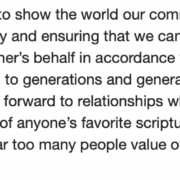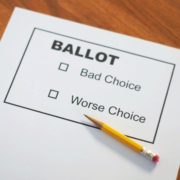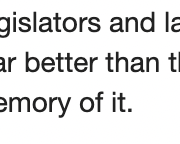Published in Culture Clash — a biweekly column in The Tribune — on June 14, 2017
THE past few years in The Bahamas have given us many things to think about. Our dissatisfaction mounting, too many of us found ourselves unable to act.
Members of Parliament did not disclose, and we were outraged. We made the time and effort to vote in the gambling opinion poll — which was framed as a referendum — only to be ignored and disrespected. There was resolve to get rid of the PLP administration and desire for more participatory governance.
There was anger and disappointment. We must figure out how to move beyond it to make progress and demand better of our representatives. It is critical that we activate and assert our citizenship outside of election season, and recognise its power on any given day.
We are underutilising our citizenship. Our conversations about citizenship are often limited to passports and work visas, seldom delving into the properties of citizenship and its direct link to government and governance.
Citizenship, at its best, is not passive. It is not wearing the title “Bahamian” and having a passport declaring our relationship with the country. It is not even at its peak when we cast our ballots every five years to elect representatives and, subsequently, the leader of the country. Citizens have the right to live, receive an education, work, and vote here. Those things come along with citizenship, but they are not the beginning and the end.
What are the responsibilities of a citizen? What are the things we should be doing to both honour and fully exercise our citizenship?
It is our duty to participate in Bahamian democracy, to monitor the work (or lack thereof) of our elected (and paid) officials, to engage one another on issues of national concern, and to agitate for the changes we need.
Regardless of how our representatives would like to posture and feign unmitigated authority, it is our duty to question. We have to challenge the systems that do not work for us, and those that are being abused to such an extent that any supposed benefit is lost on us or pales in comparison to the perks they afford to the privileged. We have to pay attention. We need to be prepared to speak openly about what we see and hear, and to make recommendations for Bahamian citizens as a collective to respond.
What can citizens do, from the ground, to effect change?
Politicians benefit from the popular idea that they are in charge. They have led us to believe that we elect them to lead and make decisions for us. They depend on our laziness and willingness to pass off our duties as citizens, allowing them to do as they wish. In truth, we are their employers, and their job is to represent us. Our issues should be at the front of their minds, and potential solutions should be rolling off their tongues.
Unfortunately, too many of us cast our votes and almost immediately disengage, content that someone else will deal with the running of the country. Some of us are busy, some of us are tired, and some of us are just not interested enough. For those of us who care about our country and its future, it is imperative that we remain alert, communicative, and ready to act.
There is a broad range of actions any citizen can take to protest, change, and create. We know our challenges, and we hold the solutions. In recent years, we have become more willing to share needs, experiences, and ideas. We communicate in a variety of ways, from the sometimes incisive, sometimes enlightening letter to the editor to the hilariously relatable and catchy song. We are creative people, constantly finding new ways to raise issues, share knowledge, and invite people to the conversation.
Talk radio has given us space to think aloud, hear from fellow Bahamians, and form opinions that need not depend solely on our individual experiences. We now have access to the realities of people we do not know, and may not even know of if we did not hear them on the radio, telling their own stories.
We have spent years honing and exercising theses skills, and desperately need to get to the next step. Some of the easiest things we think to do are writing letters to newspaper editors, calling in to radio talk shows, and share our thoughts on social media.
How do we move from conversation to collective action?
Social media — specifically Facebook — has taken us beyond one-way communication. It allows us to organise ourselves into groups and discuss issues relevant to our shared values. What do we do with the perspective we gain from this? How do our positions change based on new information?
One of the road blocks to effective collective action is lack of buy-in. This issue exists for a number of reasons including lack of trust. We ask ourselves about ulterior motives and question the methods of people we do not know. True activism and advocacy require time, energy, and other resources in limited supply, especially for nonprofit initiatives. We ask ourselves why anyone would give freely of these resources, and how long it will take for them to be bought (as we may have seen recently).
Another major roadblock is the divisiveness that inevitably comes from difference in identity or opinion, completely detracting from the shared vision.
Theoretically, many of us want the same things, but are prepared to forgo rights to ensure that someone else does not gain access to those (or other) rights (as we saw in the June 2016 referendum).
There is tremendous value in the conversations we have on a daily basis on radio talk shows, Facebook, and themed panels and fora.
We head-nod, clap, and like each other’s comments, and sometimes dive right into actions like petitions and protests. Collective action must come, but all participating citizens need to understand why we are there, together, despite difference. This requires a shared vision. There must be something we can all agree on, commit to working toward, and recognise as more importance than differences in identity and personality. We must shift the way we engage one another.
Social media can be a tool for organising, but it’s up to us to drive the conversation toward indisputable consensus that can serve as a foundation and driver for citizen-led action.
Let’s keep the conversation going, but more meaningfully and constructively toward action. At some point, we have to put our citizenship to work, and that means doing something — not just voting.











Leave a Reply
Want to join the discussion?Feel free to contribute!